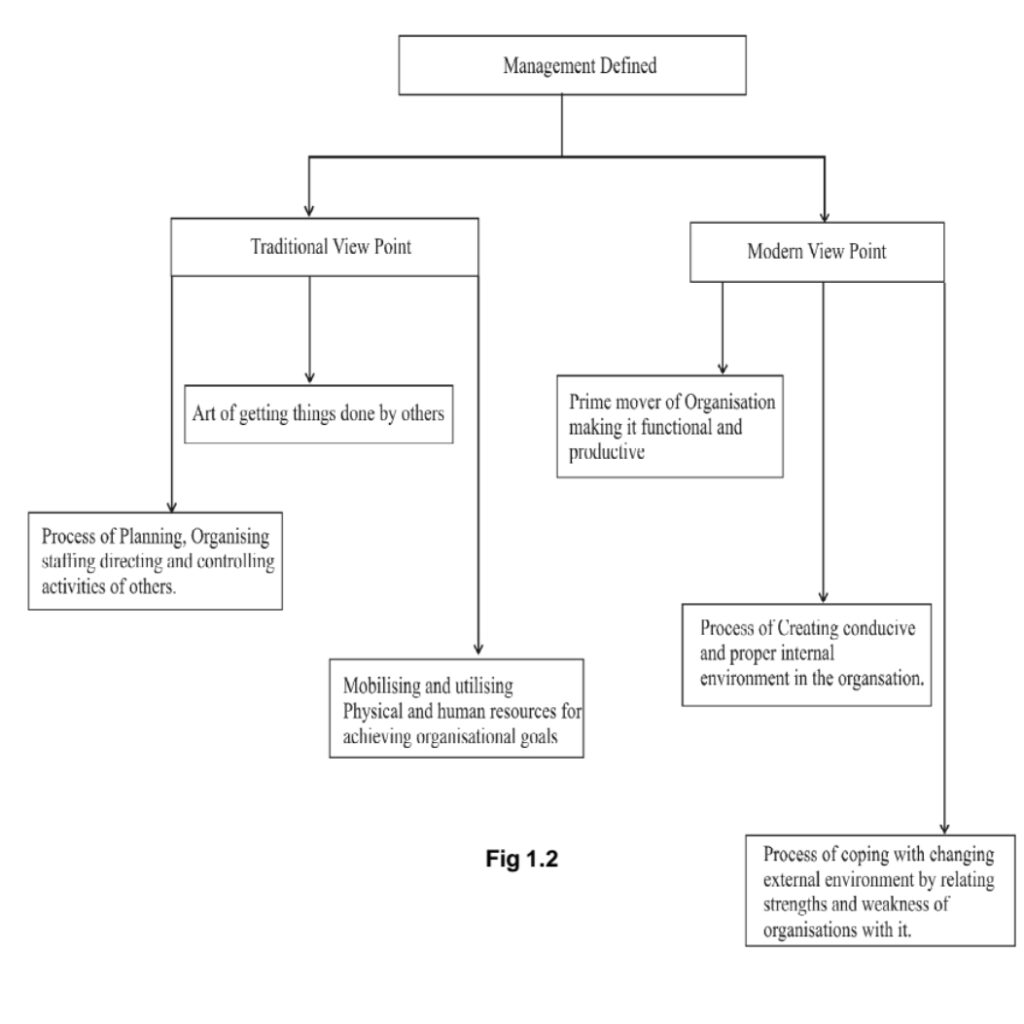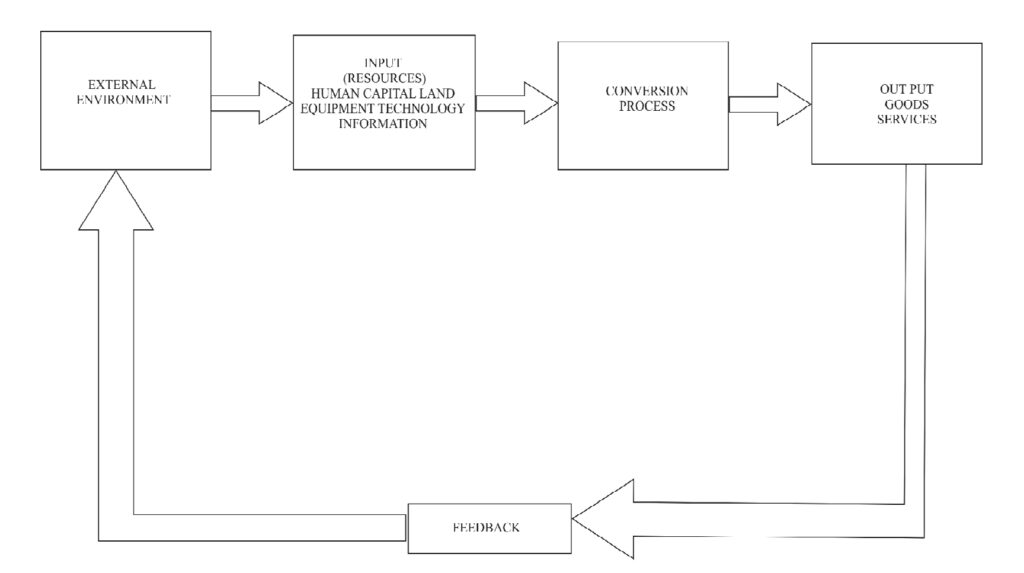Introduction:
Management is universal in the modern industrial world and there is no substitute for good management. It makes human effects more productive and brings better technology, products and services to our society. It is a crucial economic resource and a life giving element in business. Without proper management, the resources of production ( men, machines and materials, money ) can not be converted into production. Thus management is a vital function concerned with all aspects of the working of an organization.

Management is a must to accomplish desired goals through group action. It is essential to convert the disorganized resources of men, machines, materials and methods into a useful and effective enterprise.Thus management is the function of getting things done through people and directing the efforts of individuals towards a common objective.
Meaning of Management:
Management is the process of setting and reaching goals effectively and efficiently. It is associated with group efforts, purposeful, accomplished through the efforts of others, and goal-oriented. Management is indispensable, intangible, and can ensure a better life.

Management is the art of maximizing efficiency, as a social process, a method of getting things done through others a plan of action and its direction by a co-operative group moving towards a common goal. Effective utilisation of available resources to achieve same objective is management.
Management is a comprehensive function of Planning, Organising, Forecasting Co- ordinating, Leading, Controlling, Motivating the efforts of others to achieve specific objectives. Management can precisely be called the rule – making and rule – enforcing body.

______________________________________________________________________________________
Key Points of Management:
- 1. Management is associated with group efforts.
- 2. Management is purposeful and goal-oriented.
- 3. Management is accomplished through the efforts of others.
- 4. Management is indispensable, intangible, and can ensure a better life.

Definitions :
According to Harold Koontz “ Management is the art of getting things done through and with formally organized groups “.
Harold Koontz
According to Peter F. Drucker. “ A Multipurpose organ that manages a business and manages managers and manages workers and works “.
Peter F. Drucker
ording to J.Lundy “ Management is what management does. It is the task of planning executing and controlling “.
J.Lundy
According to Lawrence Appley “ Management is the development of people and not the direction of things “.
Lawrence Apply
According to F.W. Tylor “ Management is the art of knowing what you want to do in the best and cheapest way “.
F.W. Tylor
In nut shell it can be said that management as such is a science of managing men, machines, money materials and methods. It embarrassed all duties and functions that pertains to the initiation of an enterprise, its financing, the establishment of all major policies the provisions of all necessary equipment, the entailing of general form of organisation, under which enterprise is to operate and the selection of the principal officers.

Characteristics of Management :
Management involves planning, organizing, staffing, directing, and controlling to achieve specific objectives and goals. Its characteristics include being goal-oriented, universal, continuous, multidisciplinary, and dynamic. Effective managers possess leadership, communication, and time management skills, among others. The main objectives of management are social, economic, and human. It is essential for the success of any organization.
(1) Management is a group activity :
is a group activity. Nobody can satisfy all his desires himself. Therefore he unites which his fellow- beings and works in an organized group to achieve what he cannot achieve individually. Massie has rightly called management as a “ Co-operative group “.
(2) Management is Goal – oriented :
According to Theo Haiman “ Effective management is always management by objectives.” Group efforts are directed towards the achievements of some predetermined goals. Management is concerned with establishment and accomplishment of these objectives.
(3) Management is a factor of Production :
Management is not an end in itself. It is a means to achieve the group objectives. It is a factor of production that is required the co-ordinate with the other factors of production for the accomplishment of predetermined goals and objectives.
(4) It is a Universal Character :
Management is essential in all types of concerns. It somewhere there is some human activity, management is must there. The basic principles of management are universal. These can be applied in all types of concerns i.e. business, social, religious, cultural, sports, educational a International technology.
(5) Management is needed at all levels of the enterprise :
On the basis of the nature of work or target and the scope of authority, management is needed at all levels of the organisations e.g., top level, middle level and supervisor level.
(6) It is a distinct function :
Management is a distinct function performed to fix and achieve stated objectives by the use of manpower and other factors of production. Different from the activities, techniques and procedures, the process of management consists of such functions as planning, organizing, staffing, directing, coordinating, motivating and controlling.
(7) It is a Social Process :
Management is taken as a social process. It has a social responsibility to make reasonable use of scarce resources keeping in view the benefit of the community as a whole.
(8) System of Authority :
authority is the power to compel men to work in a specific manner. Management cannot work in the absence of authority. There is a chain of authority and responsibility among people working at different levels of the organization. There cannot be an efficient management without well defined lives of command a superior subordinate relationship at the every levels of decision making.

(9) It is a dynamic function :
management has to be performed continuously, in a rapidly every changing business environment. It is constantly engaged in the moulding of the enterprise. It is also concerned about the change of environment itself so as to ensure the success of enterprise. Hence it is on-going function.
(10) Management is Intangible :
It can be seen in the form of results and could not be actually seen. For ex: when we are not able to produce desired quantity, we say it is the result of poor management.
(11) It is Art as well as Science :
Management is a science since its principles have universal application. Management is an art as the results of management depends upon the personal skill of managers. The art of the manager is essential to make the best use of management science. Thus management is both science and art.
(12) It is a Profession :
It has systematic and specialized body of knowledge consisting of principles, techniques, rules and laws. It can be taught as a specialized subject.
Significance of Management :
Management plays a unique role modern society. Peter F.Drucker has summarised the essence of management as “ under developed countries are under managed, it denotes the multi- dimensional significance of management. The significance of management can be broadly classified into the groups.
- 1. Advantages to the organization.
- 2. Advantages to the society.
Advantages to the Organisation :
(I) Determination of Objectives :
The success of various operations of an organisation mainly depends on the identification of its objectives. Objectives are identified and laid down by the management.They should be the writing and communicated to all others in the management.
(II) Achieving of objectives :
It is the management which directs the group effort towards the achievement of various objectives. It brings the human and non- human resources together.
(III) Meeting challenges :
All the policy decisions of an enterprise are taken by the management. It keeps in touch with the current environment and predicts what is going to happen in future. Through better planning and control, management steers a concern to meet the demands of the changing environment.
( iv) Provides innovation :
Management infuses an enterprise with new ideals, imaginations and vision.
( v) Smooth running of business :
Management helps in smooth running of business through better planning and control.
Advantages to the Society :
(i) Optimum utilisation of Resources :
It is the management which makes optimum utilisation of various resources such as land, labour, capital and enterprise. “ No ideology, no ism, no political theory can win greater output with less efforts, only sound management”, says Urwick and Brech.
( ii) Social Benifits:
Management raises the standard of living of the people by providing good quality products at the lowest prices. It also promotes peace and prosperity in the society through optimum use of scarce resources.
( iii ) Role in national economic development :
“Management is the crucial factor in economic and social development”, says Peter F.Druker. The development of a nation mainly depends on the quality of management of its resources. It is all the more true in a developing country like India, where productivity is low and the resources are limited.
( iv ) Employment :
The expansion and diversification activities of the managers in organisations create more employment to the society. This is very essential for our country.






